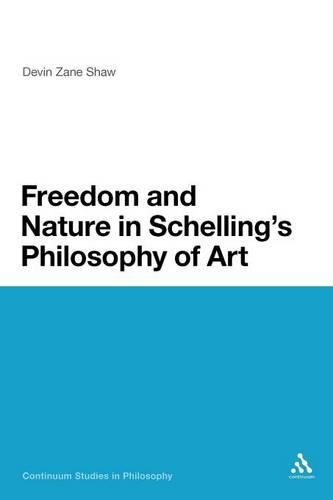
Freedom and Nature in Schelling's Philosophy of Art
(Paperback, NIPPOD)
Available Formats
Publishing Details
Freedom and Nature in Schelling's Philosophy of Art
By (Author) Dr Devin Zane Shaw
Continuum Publishing Corporation
Continuum Publishing Corporation
26th July 2012
NIPPOD
United States
Classifications
Tertiary Education
Non Fiction
Philosophical traditions and schools of thought
111.85092
Physical Properties
Paperback
192
Width 156mm, Height 234mm
Description
Schelling is often thought to be a protean thinker whose work is difficult to approach or interpret. Devin Zane Shaw shows that the philosophy of art is the guiding thread to understanding Schelling's philosophical development from his early works in 1795-1796 through his theological turn in 1809-1810.
Schelling's philosophy of art is the keystone' of the system; it unifies his idea of freedom and his philosophy of nature. Schelling's idea of freedom is developed through a critique of the formalism of Kant's and Fichte's practical philosophies, and his nature-philosophy is developed to show how subjectivity and objectivity emerge from a common source in nature. The philosophy of art plays a dual role in the system. First, Schelling argues that artistic activity produces through the artwork a sensible realization of the ideas of philosophy. Second, he argues that artistic production creates the possibility of a new mythology that can overcome the socio-political divisions that structure the relationships between individuals and society. Shaw's careful analysis shows how art, for Schelling, is the highest expression of human freedom.
Reviews
Philosophy of art provides a privileged opening onto the complexities and metaphysical dimensions of Schelling's system, an amorphous construction that extends through the diverse productions of the philosopher's lifetime. Fittingly, Devin Shaw has adopted a genetic approach, following the philosopher's virtually inchoate accounts of art in his early writings, through its explicit embodiment in his philosophy of identity, to the later writings on art, which, because of their apparently marginal character, are usually overlooked. Dr. Shaw's original and important contribution shows how Schelling's philosophy of art is informed by his earlier philosophy of nature, while anticipating his later work on the metaphysics of freedom and his crepuscular writings on mythology. -- Jeffrey Reid, Associate Professor, Philosophy, University of Ottawa, Canada
Shaw has given us a thoughtful retrieval of the problem of art that invites us into the epicenter of Schelling's project. -- Notre Dame Philosophical Reviews
Shaw's careful analysis of the various ways in which art is significant for Schelling provides a sorely-needed guide for readers of Schelling's difficult work.' -- Symposium
Shaw's dense, but rewarding study reminds us why, two centuries on, the issues at the heart of Schelling's philosophy still matter - indeed, more so than ever before. -- Paul Bishop * Journal of European Studies vol 42 issue 1 *
Author Bio
Devin Zane Shaw currently teaches at the University of Ottawa, Canada. He has published on topics in political philosophy and the philosophy of art in venues such as Filosofski vestnik and Radical Philosophy Today.
